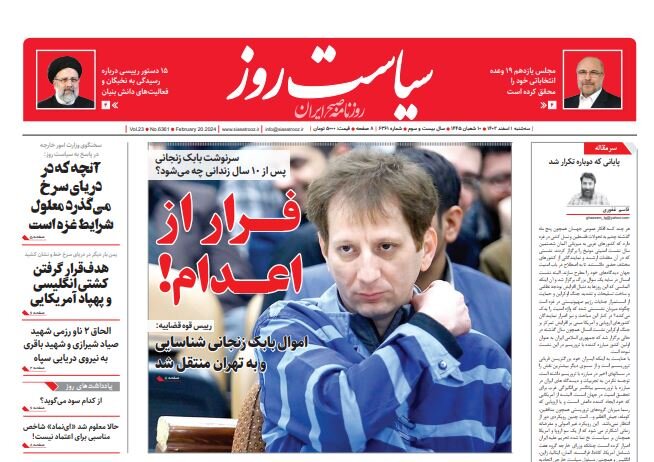The West is unreliable

TEHRAN - In its editorial, Siasat-e-Rooz analyzed the Munich Security Conference (MSC) and said: On the sidelines of this meeting, the Group of Seven, repeating their claim about Iran's regional role, said that the continuation of sending weapons from Iran to the Yemeni army is a violation of UN Security Council Resolution 2231 and causes the escalation of tensions in the region.
They also expressed deep concern about the continued progress in Iran's nuclear activities, which they claimed has no civilian justification. But Iran has always been at the negotiating table and it is the Western side that has not fulfilled its obligations. These anti-Iran atmospheres can be seen in the West's hostility towards Iran, their frustration over the imminent parliamentary elections in Iran, and their angst about the global support for Palestine. This struggle became more obvious when, in a completely supportive approach to the Zionist regime, the officials in Tel Aviv were invited and allowed to speak in Munich, but Iran was not invited. The Munich meeting added another document to the unreliability of the West and showed that interaction has no meaning in the West's logic.
Iran: The enemy and the address of not voting!
The experience of 45 years of governance in the Islamic Republic shows that the enemies of the country have always hatched plots for the elections and orchestrated various scenarios to discourage the people from participating in the elections or affecting the elections in any way, the Iran newspaper said. It wrote: Last year, the enemies of the Islamic Republic in their (2023) fall sedition had assigned all the opposition media to put the “people against the people,” but ultimately failed and it became clear that their goal was to divide Iran. It was there that the mask fell from their faces. Now, on the eve of (first of March) the Esfand 11 elections, once again the enemies have come to the stage in the media and virtual space to spread rumors and poison the public mind that participation in the elections is useless! Therefore, the enemy's current project in these days leading up to the election is the code of not voting! Why? It is because the enemy is very afraid of the people's voting and knows that elections in Iran “produce” power and build social capital. They are also aware that elections guarantee a "strong Iran" to move on the path of progress.
Ettelaat: America and Israel's new dream to eliminate Iran!
In a commentary, Ettela’at dealt with the growth of Iran's economy in the region. It wrote: Iran's North-South Corridor, TRACECA corridor, Old Silk Road (Belt and Road Initiative), South Asia Corridor and ALTID South Corridor indicate Iran's great position. The Raisi government's efforts to become a member of the Shanghai Cooperation Organization to complete the East-West Strategic rail corridors, which have global implications at the regional level, are impressive. But the hostile country of America and the Israeli regime are worried about the realization of these projects and the strengthening of Iran's power and position in the new global economic exchanges, which will be affected by economic connections between other countries, especially Iran, China, Russia, Pakistan, and India. In different methods and even giving points to other countries, they seek to create alternative routes for these economic and optimal ways. For this reason, we must play our role well and timely in the formation of the world order and try to use this exceptional situation and opportunity with intelligence.
Ham Mihan: The de-hyphenated policy of India
Since the beginning of the Gaza war, one of the trans-regional countries that has been affected by this situation is the Indian government. While India is trying to maintain its cordial relations with Tel Aviv at the height of Israel’s massacre in Gaza, New Delhi's talks with Tehran have not stopped. During his visit to Tehran last month, the Indian foreign minister discussed with his Iranian counterpart maritime security in the Red Sea, the development of bilateral relations and the continuation of cooperation in Chabahar port. Iran and India have been moving in two different directions since the beginning of the war in Gaza. The Indian government does not consider Israel's attacks as a factor in reducing the level of relations or even criticizing Israel, but Iran says that the only way to reduce tension in the region is to stop Israel's attacks on Gaza. India's wider military involvement in the Arabian Sea and the Gulf of Aden may increase the potential risks of confrontation between Iran-backed groups and India's military, an issue that can damage the relations between the two countries.
Leave a Comment